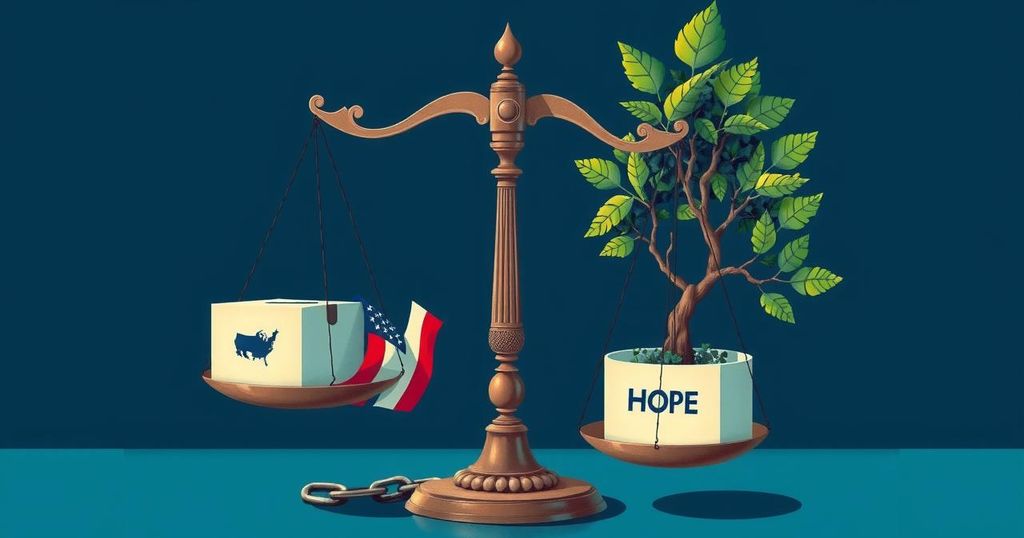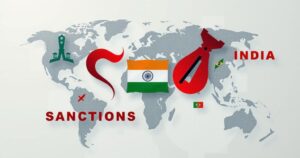Nigerians at Risk of Punishment for Apathy: The Paradox of Compulsory Voting

In Nigeria, the push for compulsory voting has raised alarms about issues of electoral injustice and irony. Citizens could face punishment for not voting while corrupt politicians evade justice. Lawmakers’ focus on coercing participation reflects a disconnection from the realities voters face. To restore faith in democracy, reforms are essential to ensure free and fair elections, rather than penalizing those disillusioned by systemic failures.
In Nigeria, the phrase “Nigeria can happen to anybody” holds a bitter truth about the nation’s political landscape. Citizens may find themselves facing jail time for not voting while politicians who manipulate elections are left unscathed. This paradox raises questions about priorities in the government and the growing disconnect between lawmakers and their constituents. It showcases a system where apathy is criminalized, yet those engaging in electoral misconduct walk free, often celebrated.
The proposed Compulsory Voting Bill has drawn scorn from many, who argue it misses the mark in terms of addressing Nigeria’s electoral injustices. Instead of focusing on punishing electoral fraud, lawmakers are keen on compelling citizens to vote, demonstrating a fundamental misunderstanding of the issues at hand. By prioritizing forced participation, the government continues to overlook the significant problems of voter suppression and electoral rigging that plague the electoral process, thus widening the gap between the political elite and the Nigerian populace.
This troubling trend indicates how Nigeria is heading towards a state where justice is manipulated against the less privileged, while those in power circumvent penalties. The notion of incarcerating non-voters expresses the absurdity of punishing individuals for disillusionment in a flawed system, particularly when electoral malfeasance occurs with apparent immunity. It is clear that implementing such punitive measures without addressing the root causes will only deepen citizens’ alienation from their government.
Certainly, voting is a civic duty, and engagement is essential for shaping governance. However, coercing participation through threats of jail time is counterproductive at best. True patriotism is built on trust, accountability, and effective leadership. When a government relies on intimidation rather than fostering an authentically participatory system, it risks alienating its citizenry entirely. Citizens deserve a democratic framework in which their rights are safeguarded and their voices genuinely count.
In a country rife with electoral irregularities, where the efficacy of the Independent National Electoral Commission (INEC) is perennially under scrutiny, criminalizing non-participation seems grossly unjust. Many citizens harbor frustrations about the electoral process due to experiences of disenfranchisement, manipulation, and violence. To penalize them for voicing their skepticism through non-participation is to perpetuate injustice, not to advocate for democracy.
Rather than enhance democracy by forging credibility in elections, the Nigerian government has shown a penchant for authoritarian tactics that threaten civic rights. Such measures reflect a disconnect from the very populace they wish to govern. To place the burden on the citizens while allowing corruption and manipulation to run rampant is contrary to any noble definition of leadership.
Looking at previous elections, instances of vote buying and intimidation were rampant, with little to no accountability for those committing these acts. The few who suffer consequences are often the ordinary citizens disillusioned with the process, while the true perpetrators bask in impunity. Criminalizing apathy while allowing criminals to roam free is a glaring hypocrisy that Nigerians must confront and reject.
It is particularly mindblowing that politicians involved in electoral fraud are the same ones promoting civic responsibility. Their narrative is fundamentally flawed; they cannot destroy faith in democracy and then blame those who withdraw from it. This reflects a systemic corruption where the vulnerable are penalized, and the powerful escape scrutiny.
True reform, not further punishment of disillusioned citizens, is what Nigeria needs if it is to escape this cycle of despair. Rather than enforcing mandatory participation, it is crucial to improve the electoral process. Creating transparent, inclusive, and fair elections would naturally encourage citizen engagement. Only then can Nigeria begin to heal its fractured political landscape and foster genuine democracy.
Ultimately, the integrity of the voting process is essential for rebuilding trust among the citizenry. Until Nigeria attends to these foundational issues with diligence, democracy will remain elusive for millions. The irony of punishing the powerless while emboldening those who rig elections highlights a gross failure of governance.
In conclusion, Nigeria’s politicians must cease the mockery of justice by taxing civic duty while letting the unscrupulous thrive unchecked. The nation’s future hinges on whether its systems prioritize justice and representation for all, or whether they continue to punish the powerless while upholding the privileged. The irony is stark, and if left unaddressed, the people will remain victims in a system they wish to redefine.
The article illustrates the troubling dynamics in Nigeria’s electoral system where citizens face penalties for non-participation, while those who manipulate elections evade accountability. It makes the case that true civic engagement cannot be coerced, and emphasizes the need for reform to restore trust in the democratic process. Ultimately, the focus must shift toward ensuring credibility and fairness in elections to address the disillusionment felt by many Nigerians. Until such changes occur, punitive measures against citizens for apathy will only perpetuate the cycle of injustice.
Original Source: thesouthernexaminer.com





